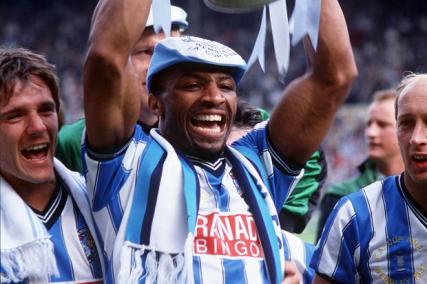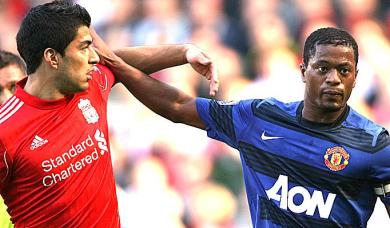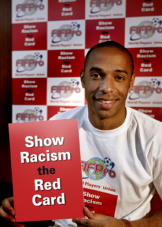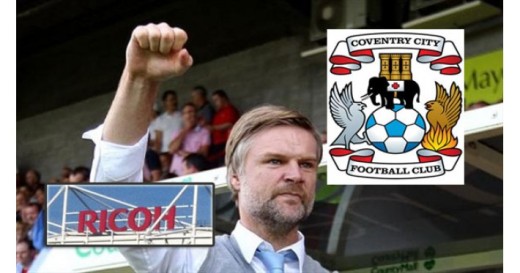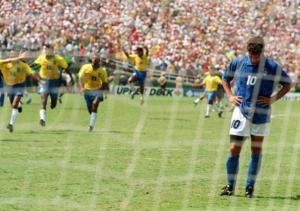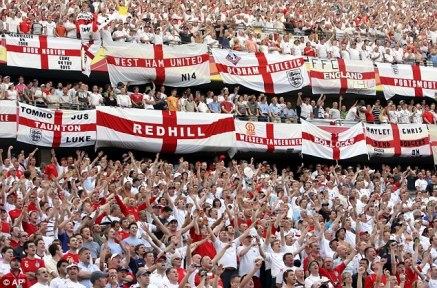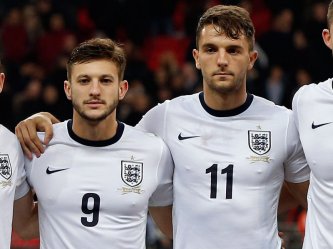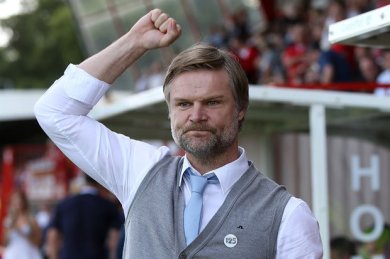Explore how racism has affected football in the past, and investigate the extent to which it still impacts on modern day professional football in the UK as well as across the world.
For as long as the game of football has been played, players have been subject to abuse; whether serious, or light-hearted. This has often been in relation to their personal appearance and stems from football rivalries both on and off the pitch. Association Football is the most popular sport in the world, with a constantly growing fan base globally, estimated to be approximately 3.5 billion. The amount of fans and followers of the game shows the passion the world has for football, from grassroots to the very highest level. Football is a major part of many countries’ histories, and now essential to their modern day cultures. Across the world, there are so many people that partake in the sport at an amateur level (amare – ‘for the love’), right up to the very pinnacle of the professional game. Football has found a way into every walk of life and, particularly in England, there is such a wide diversity of people involved. However, this diversity has caused the sport to see a nasty side for many years.
This issue is racism.
Unfortunately, racism has always been a fact of life, but with a more integrated society in modern day England, the overwhelming attitude is of equality, and racism has become a more unacceptable attitude. However, even though there have recently been some very high profile incidents in the English Premier League, the issue is less prominent in England than many other areas of the World. These incidents have brought the issue to the forefront of the media’s coverage. The vast majority of people in the world no longer accept racism, but unfortunately it remains an issue. It seems that the football environment is a place where racism can sometimes be seen, not only from fans in stadiums, but also from players as well. I wanted to explore the extent to which racism affects the professional game, as well as how it has changed over the last thirty years.
History
Historically, football has been a game played by English gentlemen. Therefore the modern game known to so many has experienced significant changes over the course of time. One of these major changes has been the introduction of ‘football people’ from varying ethnic backgrounds. Most commonly from Afro-Caribbean and African countries. This change has previously caused great tension amongst football supporters across the country; sometimes causing violence, abusive language and malicious chanting to be directed at these players. One reason for this was that to the people in stadiums, it was not common to see black people in the street, let alone wearing their team’s shirt. The introduction of new people into the country was not always well received, as the main belief was that these families were taking jobs, and would be a general strain on society. During the 1970’s and 1980’s this prejudice became discrimination, hitting an all time high with the UK seeing race riots, hooliganism and general bad behaviour towards black people. At this point in history football began to be hijacked by minority groups who used the cover of being football supporters as a means to spread racial hatred. These groups, amongst them skinheads, saw football crowds as ideal targets for them to recruit more members to their cause. Much anger was vented through football. However, many true football supporters at that time were of a generation that had fought against extremism during the war and therefore were horrified to see such fascist behaviour. Ultimately it became more common to see people with a different skin colour to the population majority on football pitches and involved in the game, therefore reducing the amount of abusive behaviour. However, racism has always been an underlying issue within the sport.
Development of Game
The first influx of black footballers into English football came in the 1980’s, with notable footballers such as John Barnes and Cyril Regis. These were most commonly from Afro-Caribbean countries, arriving with their families by boat to the United Kingdom searching for work and livelihood. These young black men broke into the game and soon became known for all the right reasons on the pitch. However off the pitch, the verbal abuse from supporters was very testing during this time. Both John Barnes and Cyril Regis played football for some of the most notable teams in English football, alongside Viv Anderson; the first black man to appear for the England National Team. With every new season, more black faces appeared in teams across the country. It soon became very common, with some of these players regulars for both club and country. With this, the majority of fans began to accept the changes they were seeing. This may have been due to the fact the population of the entire country was becoming much more diverse. The English game also saw a new crop of players arriving from European countries, mostly France and Italy. There was no longer a place for racist views as a football fan in England.
Many campaigns have been launched to ultimately try and stamp racism out of the sport in the UK, as well as across the world. In 1993 ‘Let’s Kick Racism Out Of Football’ was founded, and the body was established in 1997. Its aim is to educate young people, communities and to challenge against discrimination. A further campaign promoting anti-racism, particularly in football, is ‘Show Racism the Red Card’. This is the UK’s anti racism charity, which uses high profile footballers to educate children and adults while in their schools and workplaces. They help tackle racism in society and on average reach 50,000 individuals a year. All of the football league teams, as well as many well-known faces, including Gary Lineker and Thierry Henry, support their work.
Investigation
Racism is no longer the issue was previously in the United Kingdom, though some high profile incidents in recent years have shown us that it is still present. Over the past couple of years there have been two major incidents involving players making racial abuse allegations about a fellow professional. Both of these came in the English Premier League. These controversial incidents resulted in vast media coverage, shining a light on the dark side of the game at the very top level, involving some of the countries most well known players.
Luis Suárez/ Patrice Evra
On 15th October 2011 Manchester United played a game against great rivals, Liverpool. The game finished as a draw, however it was to be the events after the game that would throw the footballing world into uproar. Manchester United defender Patrice Evra accused Uruguayan, Luis Suarez of racially abusing him during the game. The Football Association opened an investigation into the incident that happened at Anfield. Despite Suarez’s denial of the claims and his club, Liverpool, supporting their player throughout, he was charged by the FA with “abusive and/or insulting words and/or behaviour contrary to FA rules”, including “a reference to the ethnic origin and/or colour and/or race of Patrice Evra”. He was handed an eight-match ban and a £40,000 fine. Following the verdict, Suárez received support from a number of colleagues who believed it to be unjust. To demonstrate support for Suárez, his teammates and manager wore a T-shirt bearing Suárez’s name and image before a match against Wigan. The T-shirts provoked criticism that the gesture conflicted with football’s anti-racism campaign Kick It Out. The FA’s 115-page report showed shocking evidence in support of Evra’s testimony. Suarez said to Evra during the course of the game, in Spanish, that he had kicked him “because you are black” and that he “doesn’t speak to black people”. He also used the term “negro” five times during the 90 minutes towards Patrice Evra. The FA commented that his actions had “damaged the image of English football around the world”. Luis Suarez continues to deny the incident and caused further controversy when he snubbed Evra’s handshake before the two clubs next encounter.
John Terry/ Anton Ferdinand
Following the Suarez and Evra investigation, English football was once again thrown into controversy on the 2nd November 2011, when then England and Chelsea captain John Terry was placed under police investigation following an allegation of racist abuse from Queen’s Park Ranger’s defender Anton Ferdinand. This incident was different in some ways to the first, as there was video footage that circulated the Internet in the days following the supposed incident. This obviously led to much stronger opinions from the general public, alongside the fact that John Terry held the prominent role of England captain. This role, once held by national treasures such as Bobby Moore and David Beckham, is one of great responsibility that requires personal attributes including respect and fair play. It was clear that in this instance John Terry had not conducted himself in a professional manner, the video footage clearly showed the Chelsea player utter the words “fucking black c***” in the direction of Anton Ferdinand. The Crown Prosecution Service charged him for the use of racist language; the Football Association also stripped him of the England captaincy. The trial in July 2012 showed that John Terry had used language of an offensive nature towards Anton Ferdinand, commenting on his racial background and appearance. However, due to the court not being able to determine the actual context of the situation, he was found not guilty. He was though, found guilty and charged by the FA for his unacceptable behaviour in the game versus QPR. He was handed a four-match ban and £220,000 fine, which he did not appeal. On the eve of the FA’s verdict, John Terry retired from international football after 78 appearances for his country, seeing his position as “untenable”. He later apologised for the language he used, saying that it “is not acceptable on the football pitch or any walk of life.” In a similar situation to the Luis Suarez and Patrice Evra incident, it resulted to media frenzy when a pre-match handshake was ignored. In this case, Anton Ferdinand, walking past the outstretched hands of John Terry, and Ashley Cole who was a prominent witness for the accused offender during the various trials.
Both of these incidents attracted major media coverage, for all the wrong reasons. Professional footballers are often subject to abuse for the extortionate wages they receive, and therefore at the very least the general public expect them to show impeccable behaviour. In these two cases it showed four of the Premier League’s most prominent footballers embroiled in controversy.
This controversy was not for the usual violence, fast cars or women scandals, but for something that the modern day society of England finds much more shocking. Racism. The fact is, many children too young to understand, will look towards the genius goal scorer of their team, or the big England defender with the captain’s armband as their role models. In these incidents they have brought shame upon themselves and their profession. They have a role of great responsibility to inspire future generations not only through football but also in the way the conduct themselves. Their actions are potentially shaping the behaviour of their many fans worldwide.
The role of a professional footballer is very sought after. How many children have answered the question, “What would you like to be when you grow up?” with the words “England captain.” If I take my answer as a representative of the rest of the country, then the answer is a lot of children. The responsibility of the people lucky enough to play their sport at the highest level is to ensure they set the right example and certainly not to discriminate against another human being due to the colour of their skin. It is high profile incidents such as these two cases that show footballers in a bad light, creating stereotypes against all footballers. Therefore, the cynics then shoot down any good seen in footballer’s personalities. Unfortunately, the world of professional footballers in this country has been stained by the likes of Luis Suarez and John Terry. From the perspective of parents, there is regrettably becoming fewer and fewer ‘safe bet’ names they would feel happy for their child to have on the back of their shirt.
It is well known that the area of the world which racism can be seen most frequently in stadiums is parts of Eastern Europe, Russia and Italy. In a recent documentary, ‘Is football racist?’ presented by Clarke Carlisle this was found with disturbing video evidence. Clarke Carlisle is a footballer for Northampton Town, but has played throughout the leagues in English football during his career. He is however better known for his media work as a ‘Kick It Out’ ambassador. He is also the chairman of the Player’s Football Association and was part of the PFA delegation that met with David Cameron discussing issues in football, including racism and homophobia. In the documentary aired on BBC 3 he discussed the racist abuse that many professionals had received from grounds across this country, but his main focus was on foreign countries and the problems encountered there.
He visited grounds in Poland and Ukraine where he witnessed strong racist displays from the majority of the crowd, in comparison to England where racist abuse is usually from a very small minority. This racism was very organised and abusive, often clearly inspired by fascist views and political agendas. Not only was the abuse directed at players, but also the opposing fans. Violence could often be seen in stadiums. People were subject to gang attacks due to the colour of their skin. The atmosphere in and around the grounds was far more hostile than that seen in the United Kingdom. This raised the question; are any of these countries ready to host a major international tournament?
The World Cup brings the teams ands fans of 32 countries together to one country. Average attendances at games are around 50,000. The fact it is such a major worldwide event means the range of people that attend is so diverse. With such a huge influx of people from across the world staying in a country for the duration of the tournament, it raised serious doubts as to whether it would be a sensible decision to allow some of these countries that are rife with racism the honour of hosting the World Cup. Despite these concerns Poland and Ukraine jointly hosted the European Championships in 2012. However, England fans were advised not to travel to the tournament by former England defender Sol Campbell amid concerns for their safety both inside and outside of the stadiums. The immense media coverage once again brought the issue of racism in football to the forefront of debate. Following the documentary, Clarke Carlisle had sufficient findings to criticise FIFA President Sepp Blatter following his comments that racism is no longer an issue in football.
The example of former Blackburn defender Christopher Samba illustrates the severe level of abuse fuelled by racism in Eastern Europe towards black players. Before his move back to England in 2013, the Congolese defender played in Russia for Anzhi Makhachkala and was subject to disgraceful racist chanting from opposition fans, as well as his own. During this time there was an incident involving a fan where a banana was thrown at the QPR man as he left the pitch. Samba retaliated by throwing the banana back into the crowd and commented, “I feel extremely passionately about racism in football and will never let the small community of racists break me,” Samba said. “I’m a strong character and will keep fighting for my team.” Samba’s Anzhi teammate, Roberto Carlos, the former Brazil and Real Madrid defender, had bananas thrown at him twice last year. In 2010, Lokomotiv fans unfurled a banner showing a banana in a display directed at the Nigerian striker Peter Odemwingie, who went on to join West Bromwich Albion.
Within Italy there have been a number of examples of racism shown by so-called football fans. Notably, Kevin-Prince Boateng while playing in Italy has been subject to racist taunting by ‘fans’ who he describes as having “treated me like an animal”. His reaction during a recent mid-season friendly against Lega Pro 2 side Pro Patria, was to pick the ball up in the middle of the game and kick it towards the area of the stands where the majority of the chants were coming from. He was then followed off the pitch by his teammates and the game was abandoned. His decision to walk off the pitch was subsequently supported by many football fans, commentators and fellow players.
Like Christopher Samba’s example of retaliation towards abusive fans there have been many other similar occasions in the professional game over the last 20 years. Most famously by Eric Cantona who, after being sent off, jumped into the crowd performing a two footed ‘Kung Fu kick’ on a Crystal Palace supporter. This followed a verbal assault that was believed to have demonstrated racist hatred. Despite his punishment; 120 hours of community service, a four-month ban from football and a £20,000 fine from Manchester United, Cantona’s actions showed that abuse in any form towards professional footballers is not acceptable and something should be done to fight against racism. This incident also highlighted to many people, that not only is racism in football a problem for players of a black background, but abuse in the game is also a problem for white footballers as a result of their religion, upbringing and nationality.
To understand the prevalent racism towards players on foreign soil it is necessary for us to consider the bigger picture. Whilst in the UK we have been dealing with mass immigration for decades, for some countries this is relatively new. For example, Italy has only just begun to see immigration in any significant numbers and therefore Italians are battling with feelings and circumstances that we may have been through years ago. There is much resentment for immigrants taking their jobs and whereas in the UK we have learnt to embrace the positive aspects of multiculturalism, that is simply not the case in many other countries. For example, in food markets within Italy stalls not manned by Italians and selling non-Italian produce are often boycotted. Conversely, our wider ranging population have embraced opportunities to partake of non-UK food products. With relaxed immigration policies around the world many countries are clearly struggling to come to terms with a dilution of their own identities and this has lead to an overspill of emotion in many areas. Perhaps people see football as a place they can air their resentment alongside others who may, or may not be, like-minded? However, racism is actually prevalent in all walks of their lives but the large crowds that football draws provides a natural outlet for extremists who see large male dominated crowds as a way to vent their emotions.
So why is it that a large football crowd can be lead away from purely watching a match to racially abusing players within it? Some sociological behaviour may help us to understand why this may be. The idea of “mob behaviour” was first put forward by 19th-century French social psychologists Gustave Le Bon and Gabriel Tarde. Herd mentality or mob mentality, describes how people are influenced by their peers to adopt certain behaviour, follow trends, and/or purchase items. Herd mentality can cause people within groups to behave in a similar way to others within that same group. However, negative behaviour of large crowds within a football stadium falls into the category of ‘mob mentality’. There are two main factors that exist within these groups; these are the distribution of responsibility for the group’s actions and greater anonymity. These factors may lead to a person acting in a way not usual for them, as they believe that the consequences of acting in a group will not be the same as if they had acted alone. For example, if a person is in a group racially abusing a footballer they may feel less guilty as they are not the only one. They see safety in numbers and also may believe that there is less chance of getting caught and being identified.
These sociological factors may explain why football is a natural target for people who hold racist views as they see football as a place they can air their resentment alongside others who, even if they are not like-minded, may also become embroiled in the same negative actions. Therefore this makes the football stadium an outlet for resentments fuelled by extremists who see male dominated football crowds as easy converts to their cause. The extreme levels of violence seen in UK grounds during the 1970s and 1980s were led predominantly by skinheads hoping to encourage the real football fans to also act in that way despite the fact that many had given years of their lives and witnessed the sacrifices made to fight against such fascist actions and views. A potential way to counter this behaviour would be to introduce mixed seating for fans, where the away supporters and home supporters are sat evenly spread around stadiums. This can be seen at Rugby matches. It would separate the racist fans and ultimately stop the sense of ‘mob mentality’, as they would be on their own or in smaller groups.
However, to contradict the negative aspects of ‘mob mentality’, the actions of a full football stadium one afternoon in March 2012 in central London can be used to highlight the immense power of a football crowd when united for the common good. To call this an example of ‘herd mentality’ seems to take away from the fact that every member of this crowd held a personal and genuine desire for a positive outcome…
The footballing world came together in 2012; uniting for African born footballer Fabrice Muamba, after he suffered a cardiac arrest on the pitch in an FA tie against Tottenham Hotspur. Fabrice Muamba was born in Kinshasa, Zaire in 1988. Due to political conflict his father fled to the United Kingdom seeking asylum. In 1999, he was granted indefinite leave to remain, at which time he was joined by the rest of the family, including Fabrice aged 11. They settled in East London and despite not being able to speak English when he arrived, Fabrice completed school gaining 10 GCSE’s and A Levels in English, Maths and French. As a schoolboy Fabrice was involved with Arsenal FC’s youth system, and despite originally being released he persevered and signed his first professional contract for the club. He played for Birmingham City and Bolton Wanderers between 2006 and 2012. He also represented the England National team through all youth levels and eventually captained the England U19’s.
When Fabrice Muamba collapsed in the 41st minute of play the crowd reacted as one. Amy Lawrence, writing for The Guardian was in the stadium and described the actions of the crowd,
“Everybody felt helpless, yet impelled to do something that might help in some tiny way. Spontaneous applause broke out, as noisy and compelling from the Tottenham fans as the Bolton faithful, and some urgent shouts of encouragement, before Fabrice Muamba’s name was sung. There was a tangible sense that everyone was willing him on, willing the medics on.”
Would the response from a crowd in Eastern Europe or Italy have been the same? Would the racist taunts have been drowned out by fans longing for a positive outcome? We can only speculate but I only hope that it would have been.
The response from the footballing world in support of Muamba during this time was incredible, with moments of thought dedicated to the recovering footballer at every Premier League ground. Teams from across the globe including Real Madrid and Barcelona used t-shirts messages of support to warm up in and many of Muamba’s fellow peers displayed their thoughts for him in their celebrations, regardless of how well they knew him. The trend ‘#PrayForMuamba’ soon became a global message and the situation was probably best summed up by Tottenham defender Kyle Walker who stated on Twitter, “Doesn’t matter who you support. Doesn’t matter if you aren’t a football fan. Doesn’t matter if you aren’t religious. Pray for Fabrice Muamba.”
In the UK the whole nation displayed unity for the former asylum seeker, no one had to be told how to behave; good grace came entirely naturally; tribal loyalties were abandoned without question; not a single voice was raised against Howard Webb’s abandonment of the match. The only thing of importance on that evening in London was whether the man was going to survive, not what colour skin the footballer had. The whole incident humanised professional footballers as a whole; in the following days showing the trauma his wife and son were experiencing, and allowing the world to hear of Fabrice’s remarkable story. Amongst the global business of football, detached from the masses by greed and money, the sport of football was put into perspective, and saw a raw, emotive statement from the majority of people about what’s really important. Forgetting rivalry, race, religion or background, a 23-year old man lay on the grass needing a miracle, and the footballing world answered defiantly.
Social media is now a fact of every day life. Many professional footballers use it as a way to promote things, communicate with fans and socialise. However, despite its many positives, it can also cause much controversy, with every update being scrutinised by the press and public. During the following weeks after Fabrice Muamba’s cardiac arrest, Twitter was used in a very positive way.
However, social media has also become a way to express ‘banter’, which people may or may not find offensive. Recently the brother of racially abused Anton Ferdinand, Rio, was fined by the FA for a tweet that referred to Ashley Cole as a ‘choc ice’. The press was in uproar at the connotations of the tweet. However looking at the context, was there any malicious meaning behind the comment? Rio Ferdinand and Ashley Cole have shared a pitch for England together for over 12 years. In this case, it looked as though it was naïve to make the comment on Rio’s part, but can be dismissed as ‘banter’ between two professionals. This raised the question; at what point does banter become racist? Between groups of friends people know the limits they can take banter to, and whether there is real offence meant to be caused, but at the professional level, banter or not, every comment will be analysed to find a racist meaning. This is not only an issue for players, but fans as well. That is a fact of the world we live in, filled by social media and press waiting to find a new story. This incident highlights this and shows that if you have the honour of playing the national game and making a living from it, your behaviour should be responsible and impeccable at all times while in view of the whole world.
The number of black players within the English Football Leagues has undoubtedly increased over time but why are there very few black managers? This is a very common question amongst football fans in England. It is a fact that comparatively, the amount of black football managers is much fewer. The question is why? There have been enough black footballers ply their trade in England, and subsequently finish playing, to expect more to have taken a route into management after their playing career. However, very few of these have done. The amount of black managers in the football league is normally very stable, around three or four out of a possible ninety-two. Players of an ethnic minority make up around a quarter of the players in the English Football League, so it is surprising that this is not matched in terms of managers and coaches. A factor that may be affecting this could be the lack of opportunity. However it could possibly be down to a more challenging route into management as a result of underlying stereotyping and expectations. A discussion article, ‘Why aren’t there more black football managers?’ by Ellis Cashmore and Jamie Cleland discussing the issue, found that many fans allude to institutional racism, in which people do not consciously discriminate against minorities, but fail to challenge old assumptions and stereotypes. This means a pattern of operations continues in football management. ‘People appoint people like themselves. White chairmen appoint white, male managers. The cycle is not easily broken.’ This suggests that black managers have fewer chances; if they fail once, they will find it much harder to get another role. Whereas, many failed white managers, are re-involved in football very soon after being sacked.
Conclusion
Racism within football exists, as it does in all aspects of life. The extent to which it exists in the UK compared to other countries is clear for all to see as public displays of racism are less tolerated within our society and so are reported extensively by the media. Is the fact that the incidents of racism within the UK are so widely reported an indication that a very small minority of people now only hold these racist opinions? It must be true to say that social media now allows a platform for once private views to be dissipated widely with the press of a button but it is also this social media that allows instant mass condemnation of outdated and offensive beliefs. Thankfully the majority of people will not sit back and tolerate racist opinions, it is no longer an acceptable attitude to have. In the English League every team now has a player of an ethnic minority playing for them and I would be confident in saying that each one of these teams also has fans from different ethnic backgrounds.
As mentioned previously, the football arena will always be a natural target for extremists who hide behind football as a way of venting their vicious viewpoints whilst attempting to find other converts to their cause. The part that sociological factors play within this should not be understated. ‘Mob mentality’ certainly goes a long way to explain why football crowds are sometimes led into voicing comments and showing behaviours that have no place in any sporting arena or other aspects of our lives. However, it is important not to forget that examples of racism in the UK are now actually few and far between and the fact that they are so widely reported is testimony to the fact that our society now embraces players from around the world, irrespective of their race, colour or religious beliefs. Furthermore, as our society becomes more integrated and as the Fabrice Muamba’s of this world settle here and produce their own families then we can hope that racism will become even less prevalent, not just on the football pitch. As for other countries, it seems many will be working through this issue for many more years to come.
Project written for my AS Extended Project Qualification – April 2013.
